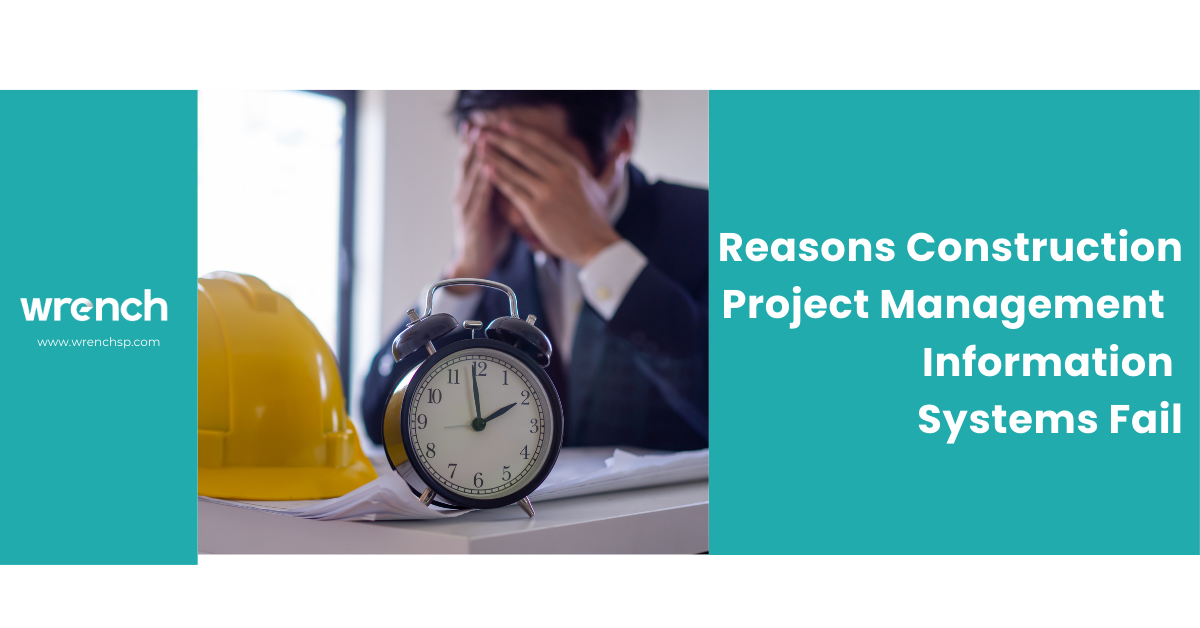Reasons Construction Project Management Information Systems Fail

Now that the EPC industry is opening up to digital project management solutions on a large scale, why do projects still fail? Why, despite the growing popularity of PMIS in construction projects, do projects still get delayed and go over budget? That’s the million-dollar question.
Here’s the truth: a project management information system in the construction industry is not a magic cure, nor is it a one-size-fits-all or out-of-the-box solution. A PMIS is simply a tool that helps you plan, execute, and monitor projects more efficiently than before, by leveraging digital technology to automate key processes. But with so many vendors in the market today the real worth of a PMIS can be easily lost – or distorted. So companies looking to invest in a PMIS should be careful to set their expectations correctly. For example, a PMIS in construction projects that lacks internal buy-in will not be effective, no matter how enticing the actual software features or how good it looks on paper. Sometimes what users actually do with the PMIS software is a far cry from what was intended. Not surprisingly, in such cases the PMIS evaluation shows little ROI.
Now, since the fault lies not so much in the actual PMIS itself as in the way it is implemented and used, it is logical to address those challenges and see if they can be nipped in the bud. What are those challenges exactly? It might be easier to answer that by flipping it on its head, namely, define what a ‘good’ PMIS would be, in an ideal world.
An effective PMIS is flexible enough to support a smooth transition. Meaning, the company and the vendor should be sensitive to and aware of the existing company climate and take into account the human reactions to the new system. Is it too complex? If so, better training might be the answer. Is it too different from the previous work methods? A slow transition rather than a sudden shift might help.
Bottom line, adapting to a new way of working is never easy, and in process-driven organisations like EPC companies the problem of transition can be compounded by environmental or cultural factors as well.
Another reason PMIS in construction is not a slam-dunk is because the company bought the wrong software. Meaning, it bought a marketing promise, not a business solution that actually aligns with its operations on the ground. Software companies can get too focussed on specific metrics when it comes to designing a product and those metrics may not necessarily work in the real world of EPC projects which are rarely as linear as they look on paper. The best software evaluated as software might not be the best business solution for an EPC company. You need to evaluate it in a different way.
Take for example the very planned vs actual phenomenon that is common in EPC projects. Any projects company knows and plans for missed deadlines, reforecasting and re-alloting resources, budgets, manpower because they are used to these constant changes and shifting deadlines/plans – but a software vendor might not be. The software companies that built your PMIS may not even be aware of the fluid nature of project management, or that it is the norm rather than the exception.
It is worth while seeking out vendors who have a background in EPC and understand the nature of projects, so that they know what they’re dealing with beyond the mere software features.
In fact, it would be better to evaluate the PMIS less on its technical or software elements and more on its EPC-friendliness, so to speak. Meaning, does the vendor understand how project workflows work in real life, across geographies? How stakeholders collaborate? Reporting requirements? Handoff pressures? Manpower and resource planning strategies? If not, how can the software solve any of it? Mere automation is not enough.
However, the biggest problem that turns a PMIS implementation sour is the lack of integration. The word ‘integration’ is often thrown around, yet not always understood or used correctly.
Integration is not a marketing buzzword. It is a precise and accurate descriptor of how a PMIS will function within and alongside the project lifecycle – the people, the processes, the other applications used by the company (email, CAD, Excel, Adobe, etc.). An integrated system is one where each of the tasks and functions ‘talk’ to each other from within the same system, and the data from one step in the process is fed automatically to the next step – eliminating the need for human intervention. For example, a report generated in an integrated PMIS will contain data that has been automatically captured at the source, verified by the required people, fed into a pre-approved template, and sent, still automatically, on a pre-set date to a pre-set mailing list – all within the one system. And imagine other project functions following the same automated path.
That is what is lacking in many PMIS systems today, and why so many projects still continue to fail despite the adoption of best-in-class or big-brand software system – so maybe what we really need is a recalibration of PMIS evaluation criteria.
Related Posts

EDMS Features and Functions
When an EPC organisation, be it an owner, architect, contractor, or consultant, starts on a journey of digital transformation the first step is likely an EDMS or engineering document management system. The expectation is that…
- 10 Apr 2025

Engineering DMS vs Electronic DMS
The term EDMS has become commonplace in engineering-related sectors these days, especially in EPC project verticals where the management of technical documentation is a key factor in successful project delivery. It must be noted that…
- 04 Apr 2025
Archives
- April 2025
- March 2025
- February 2025
- January 2025
- November 2024
- October 2024
- September 2024
- August 2024
- July 2024
- June 2024
- May 2024
- April 2024
- March 2024
- January 2024
- December 2023
- November 2023
- September 2023
- August 2023
- July 2023
- June 2023
- May 2023
- April 2023
- March 2023
- February 2023
- January 2023
- December 2022
- November 2022
- September 2022
- June 2022
- May 2022
- April 2022
- March 2022
- January 2022
- November 2021
- October 2021
- July 2021
- June 2021
- May 2021
- March 2021
- February 2021
- January 2021
- December 2020
- November 2020
- September 2020
- August 2020
- June 2020
- April 2020
- March 2020
- February 2020
- January 2020
- November 2019
- October 2019
- September 2019
- August 2019
- April 2019
- March 2019
- December 2018
- October 2018
- September 2018
- August 2018
- July 2018
- June 2018
- May 2018
- April 2018
- January 2018
- November 2017
- October 2017
- September 2017
- May 2017
- April 2017
- March 2017
- February 2017
- January 2017
